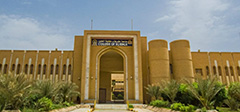Abstract
A pot assay on the plastic container of the wire sunshade in the University of Kerbala's Agricultural Division was conducted to research the impact of potassium treatment, the salinity of irrigation water and ascobin sprinkling, just as their connections, on the some plant hormones activities (auxin, gibberellin and abscisic acid) in developing Zea mays crops in a soil with sandy texture during the farming fall period of 2017–2018. The trial was planned as a factorial one with three factors, Potassium adding are 0, 100 and 200 Kg K.ha–1 . the irrigation water salinity are 1, 3 and 6 ds.m–1; and the third factor incorporates foliar application with 0, 300 and 600 mg.L–1 ascobin (ascorbic acid + citric acid 2:1) at two phases: the main stage at 6 leaves and 21 days after germination and the second stage at 12 leaves and 70 days after germination. This test included 81 exploratory units dependent on a complete randomized design (CRD) with three recreates. The outcomes show that variables engaged with this experiment and their associations significantly affect the some plant hormones activities , which increment when the foliar ascobin application focus increment. The outcomes likewise show the chance of utilizing saline water for Zea mays irrigation when the foliar ascobin and potassium are adding .
Recommended Citation
Al-Samak, Qais Hussain Prof. and Karim Khudair Alasadi, Fatima
(2020)
"Hormones of Maize Crop as Affected by Potassium Fertilization , Water Quality and Ascobin Foliar Application .,"
Karbala International Journal of Modern Science: Vol. 6
:
Iss.
3
, Article 2.
Available at:
https://doi.org/10.33640/2405-609X.1534
Creative Commons License

This work is licensed under a Creative Commons Attribution-Noncommercial-No Derivative Works 4.0 License.
Included in
Biology Commons, Chemistry Commons, Computer Sciences Commons, Physics Commons




